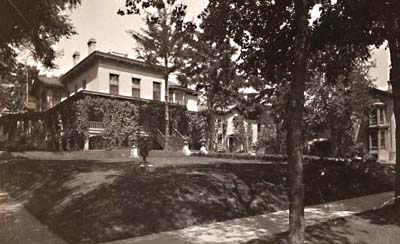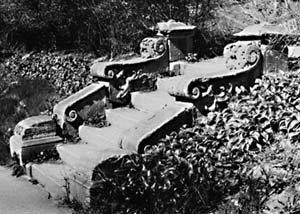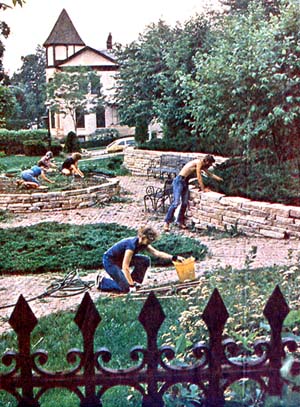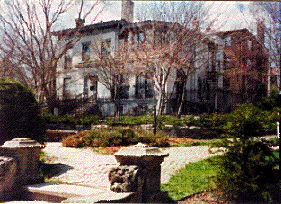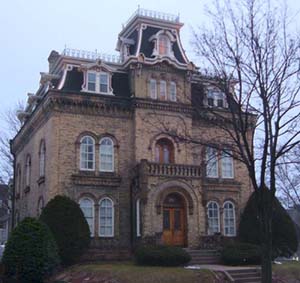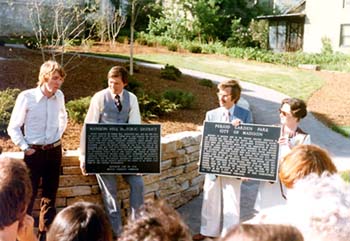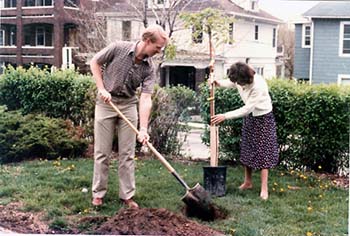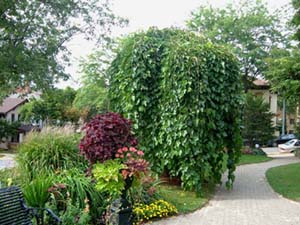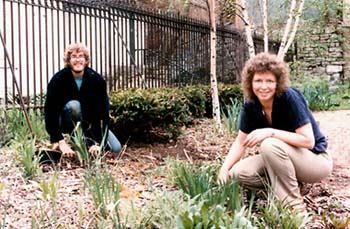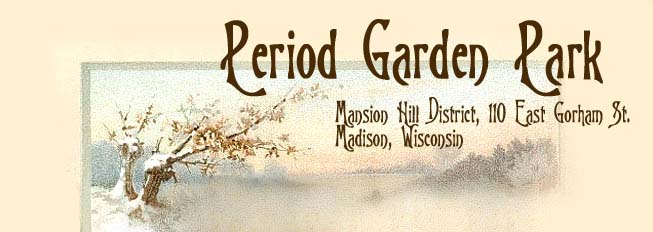

History of the Park's Development, From Park News, Fall 2002:
Period Garden is a small park, .235 acres, at Gorham and Pinckney Streets. This was once the front lawn of the Elisha W. Keyes House, at 104 E. Gorham, which was built in 1853-1854. In 1972, the owner of the property (at that time a parking lot), proposed building a 30-unit efficiency apartment building on the site. This would have hidden the facade of the Keyes House, which had just been named a landmark by the City Landmarks Commission, and seemed inappropriate for the Mansion Hill neighborhood. A private citizens group organized to buy the property to save it from development. The land was purchased and the park created through a combination of private contributions and State and City funding.
In 1975, after the City took ownership, the Civil Engineers of the Air National Guard removed the asphalt parking lot. A park was designed to resemble the type of garden that this neighborhood once enjoyed. The park combines areas of grass with planted flower beds. The brick walkways and carved sandstone steps are typical of Madison gardens of that era. The wrought iron fence on one side of the park dates back to the period, and was moved to Period Garden from Forest Hill Cemetery. Period Garden Park was formally dedicated in 1977. Over the years, the City has provided money and maintenance, but budget constraints have sometimes left the garden in poor shape. The Madison Trust for Historic Preservation and individual volunteers were instrumental in caring for this quiet and lovely space. Wisconsin State Journal Quotes about the Park from Gary Tipler, 1982
"Period Garden Park is the result of years of effort to enhance the historic character of the Mansion Hill neighborhood. The fresh new landscaping is complemented by recently installed period cast iron lampposts. Newly mounted plaques describe the history of the park and the area. In 1973, a citizen group successfully lobbied to stop a 24-unit apartment building from being built on this spot. A private non-profit corporation was formed to purchase the lot from the owner/developer. With the city serving as steward for the land, other funds were sought to secure the parcel and make improvements. At the same time, other Mansion Hill buildings of historic importance were being reviewed. The general public support resulted in the passage in July 1977 of the Mansion Hill historic district ordinance. The city law provides guidelines to encourage remodeling and new development consistent with the historic character of the area Among those active in developing the Period Garden Park proposal were Henry Luffler Jr., City Alder of the 16th District, and Dick Wagner, County Supervisor of the Sixth District. Residents raised $ 20,000 privately, with which an option on the property was purchased and held until state and federal funds were obtained. In 1977, an asphalt parking lot was removed, and major landscaping began. Because of lack of city funds, volunteers began the long tradition of maintaining the park with privately raised funding and their own labour."
A New Beginning Since the Spring of 2007, Capital Neighborhoods Inc. and Mansion Hill District neighborhood volunteers have begun a new chapter in the restoration and improvement of the park. These dedicated individuals have exceeded their goals for the Park. Recently, volunteers have...
In June, 2008, Isthmus Newspaper in Madison published an article on the exciting developments and improvements in the park. Click here to read the article in PDF format.
A plaque at the front of the Park references the Mansion Hill Historic District, of which the Park is a part: "Known variously as Yankee Hill, Aristocrat Hill, and Big Bug Hill, the area north of the Capitol Square near Lake Mendota was selected by Madison's business, political, and academic elites in the 19th century for their homes. Successful bankers, timber barons, real estate promoters, railroad lawyers, University regents, professors, governors, judges, and mayors resided on the Hill. The seed of the Wisconsin Idea may have been planted by informal discussion and formal associations among these neighbors when they cooperated to determine public policy and direct the course of events. Large residences of dressed stone, fancy brickwork, and elaborate carpentry testified to their position and taste. While outstanding structures are individually designated landmarks marked with plaques, the entire district reflects the fabric of an upper-class turn of the century neighborhood."
|
